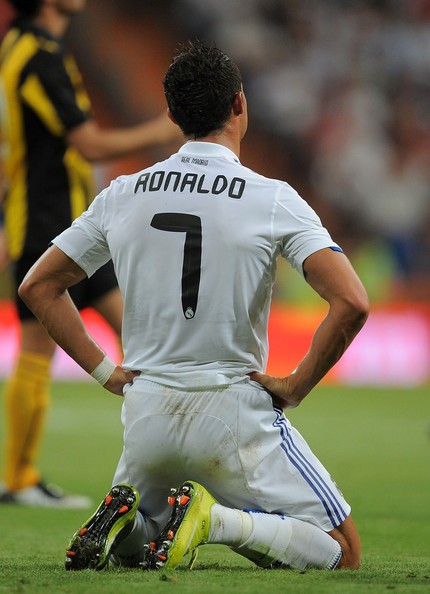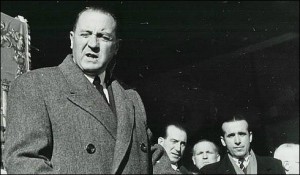Santiago Bernabeu (Looks a little bit like Marlon Brando, doesn’t he?)
The recently concluded Super Copa once again concluded with a lot of controversies with Mourinho once again playing a central role in them. Enough has been said of Mourinho’s despicable act and Marcelo’s crazy tackle. But in midst of the barrage of criticism coming from the former Real Madrid players there was a central theme in all of them: that this act did not suit the “image” of Real Madrid; That this was not in line with the principles of “Madridismo”.
The word “Madridismo”, has been thrown around a lot whenever there is a conflict between fans of Real Madrid regarding anything. But seldom have the people been so united in saying that this did not represent the spirit of “Madridismo”.
So what, then, is Madridismo?
The best and most appropriate definition (and the most universally accepted one) came from El Pais’ Luis Gomez who says it is
“The personal, paternalistic leadership style of Bernabeu instilled in the club a simple ethos that resembled that of a religious order more than that of a political organization. The main elements consisted of a sense of austerity, hard work, humility and honesty. Real Madrid transmitted these values through its players onto the field, summarized in a term that has come to be known as señorío”.
Add the element of always playing to win and you have the most complete definition possible.
Nobility
This also mentions one of the more interesting values of Madridismo: “señorío”. Señorío, if seen as a standalone word, is associated with Monarchy and feudal regime (No more Franco potshots please!). Feudal here refers to a system where a kingdom or country was ruled by a king who had given considerably large powers to certain extremely powerful nobles, in order prevent revolts. In essence, señorío was a concept associated with nobility. Since Real Madrid was one of the first few clubs to be given the royal patronage ( thereby using the word “Real”, the Spanish word for “royal”) they have tried to portray a certain degree of “class” or dignity in their behavior on and off the pitch.
Senorio, essentially means stateliness or majesty of behavior.
Real Madrid, frankly speaking have never really made any pretentions about arising from the grassroots or being working class. They have always prided themselves of belonging to the upper class; of having that proverbial “stiff upper lip”. So much so, that they have been branded as “chulos” by other sections of the Spanish public as Phil Ball mentions in his book “The White Storm”. Chulos in this context means “big-headed” or “too full of themselves”. Also it means being thick skinned enough to withstand all the insults that come with acting slightly aloof and ignoring all the insults.
Talking of insults, a very popular phrase coined after the Franco regime had crumbled was “Así, así, así gana el Madrid!” literally, “like this, like this, this is how Madrid win”: This spontaneous cry that has been immortalized in the choreography of songs in Spanish football was born on November 25, 1979 when an opposition player Enzo Ferro had seen sent off for kicking San Jose who later on was injured for 14 months and had his career cut short by several years.
Of course, the Madrid fans have turned this original negative connotation around and the chant is ironically used by them when Real Madrid win playing beautiful football, signifying that beautiful football is a part of their nature.
Love and Forbidden Love
In fact Real Madrid fans are legendary for singing songs for the club, rather than the players themselves. The only notable exceptions are Raul, Guti, Casillas, Ramos and Van Nistelrooy, who in fans’ opinion gave it all and “sweated” for the badge. Madridismo at its finest.
While we are on players a few quotes on them and by them wouldn’t be out of place either.
Iker Casillas “Todo el mundo sabe que soy Madridista de corazón, blanco hasta la muerte.” (The whole world knows that I am a Madridista by heart; White until the death).
“When you put on this shirt, you know that you’ve arrived at the very top. There is no greater honour.” – Sergio Ramos
When one talks about Los Blancos, 4 figures are enshrined in history: Di Stefano, Santiago Bernabeu, Raul and Perez.
Franz Beckenbauer came up with this gem of a quote about Raul – “He is like Matthäus for us: indispensable, and with a bad haircut”.
Another gem of a quote about Raul came from none other than the legendary coach Sir Alex Ferguson: “I hope he doesn’t like travelling. Failing that we will stop him entering the country”. It was gallows humour at it very best.
Ruud van Nistelrooy “Madrid is incredible. I will never forget what this club has done for me. But this transfer was like forbidden love”.
Ruud remembering the good old days, talking about his love for Real Madrid and how it was forbidden when the sudden transfer request was denied by Hamburg.
Sweat
Another element of Madridsimo that is very important is, working hard and sweating to earn the respect.
You have to first sweat in it sonny!!! (Only then you get the badge)
When Amancio Amaro (who was to become a famous “ye-ye” figure later), on wearing the shirt for the first time, commented that it had no badge on it, he received an extremely caustic reply from Don Alfredo in form of the legendary phrase “Primero hay que sudarla chava!” (You have got to sweat in it first sonny).
This is how much Real Madrid meant to Don Alfredo and how much reverence he had for the badge.
Another interesting quote about Di Stefano came from the man who made it all possible: Santiago Bernabeu.
“Este tio huele a buen futbol” (This kid smells of good football).
Bernabeu made this remark even before he had seen Di Stefano in action; and this was confirmed when Di Stefano scored 4 goals in 2 matches to help his humble side record a 4-2 victory and 2-2 draw against the Spaniards.
“Remontadas” or Comebacks
Another one about Bernabeu, albeit the stadium this time. One of the most immortal phrases to be said by a player about a quintessential Madridismo trait of making late comebacks:
“Noventa minuti en el Bernabéu son molto longo”. “90 minutes in the Bernabéu is a very long time “.
Antonio Banderas or Juanito? Take 90 minutes in Bernabeu!!
In 1984 Real Madrid’s legendary defender Juanito cockily retorted back in Italian to the Inter Milan provocateur when Real had lost 2-1 the first leg. In the second leg, he made his boast good when Real thrashed Inter Milan 3-0 and recorded an extremely sweet “Remontada” or a “comeback victory”. This reply combined combined with his phenomenal abilty ensured his status in the folklore with a chant that is heard even today: “illa, illa, illa; Juanito maravilla”
“No hay nada como una buena remontatda en el bernabeu” (There is nothing better than a good comeback in the Bernabeu).
When one talks of comebacks, the “ye-ye” generation is a part of folklore, who made it a point to score late goals to win and keep their supporters on the edge of their seats till the very last moment. The remontadas have been made a part of Real folklore ever since “ye-ye” era.
At Bernabeu we celebrate only victories
“What for? We celebrate only victories”.
Talking of winning, even Del Bosque was no pushover despite his avuncular image. When Real just managed to qualify for Champions League and failed to win the La Liga, Del Bosque wasn’t overly pleased.
Infact, when it comes to victories, Real are extremely merciless. Not only they want to win, but they also want to win in style. This is an essential feature that Madridismo demands. Win and win in style or you will be sacked. There is no better Madridista than Jorge Valdano to explain what beautiful football means to the Bernabeu faithful. This is a classic quote when he talked about the terms that played defensive football.
“I like a lot of the Chelsea players but I don’t like the team’s style. If Chelsea played Juventus in the Champions League, I’d rather spend the time in the backyard”
Finally, some quotes from Florentino Perez to top it off.
“Zidanes y Pavones” the most famous phrase of them all. When ushering in a policy of Galacticos and home grown players. Of course the spectacular collapse that followed is the stuff of legends. How Madridismo demands the club handle failure is easily visible in the departing comments of Perez when he announced his resignation. Proud yet humble.
“I really enjoyed the first four years. It was the happiest stage of my life but everything went wrong after Camacho quit. He showed he was a Madrid supporter but he left the club less affected than me”.
“The person who coaches Real Madrid needs to be disciplined, rigorous and professional.”
“I’d do it all again. I believe in emotions and spectacle, and without this magic it wouldn’t be Madrid.
The club needed a change. We’re not in the best shape. We had tried changing coaches several times and that didn’t seem to work, so the only other option left was for me to leave.”
This is what Madridismo is all about. Winning. Winning with style, humility and dignity.

